“¡Vendedores unidos, nunca serán vencidos!” “Vendors united will never be defeated!”
It was close to 11:40 AM when a crowd of supporters and vendors chanted as a caravan of over a dozen ice cream trucks, followed by fruit vendors, and taqueros rolled into City Hall with their nostalgic ice cream tunes echoing out of each truck.
With just one week left before the closure of La Palma Ice Cream & Candy Commissary in Cypress Park, street vendors and food truck owners who have rented a space at La Palma for more than 20 years took action on Monday to protest the sudden closure of the commissary.
Vendors like Marwin Carranza who owns an ice cream truck named “Monkey’s Munchies,” are one of 150 vendors who were suddenly notified last month, that the commissary would be closing.
“There was no warning, no previous communication, on the 14th we showed up to the commissary like we always do and we all had notice papers on our trucks and carts,” he tells L.A. TACO.
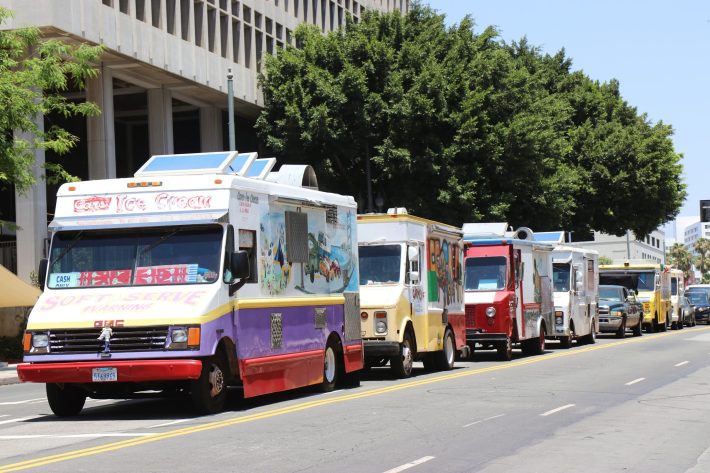
Over a dozen ice cream trucks, fruteros and taqueros protested the sudden closure of La Palma Commissary. in Cypress Park.
The notice briefly explained that the owner of La Palma had decided to not renew his lease for the commissary giving the vendors a month to find a new location to store their trucks and carts. However, vendors who gathered at city hall described the situation as an unjust eviction.
Carmen Reyes, who also owns an ice cream truck named after herself, said she has been renting a space at the commissary for the past 23 years. To her what was most upsetting about the entire situation is that the owner did not communicate with them in advance, even though they saw him four days before the notices were placed on their trucks.
“I saw him on May 11, and I asked if it was true that he was closing or selling the commissary and he said ‘no’ that it wasn't true,” she explained as she stood beside her parked truck. “Then days later we see the notices, eso no está bien, (that is not right,) some of us have been here for years with no problems why not let us know?”
What concerns vendors the most is how they could lose their legal right to sell the moment the commissary closes its doors. In order to sell legally in Los Angeles, anyone operating out of a food truck or a push cart must rent a space in a commissary where they can store and wash their carts and food trucks daily. This is a yearly requirement needed in order to obtain and maintain a health permit. If they fail to do so, their permits get suspended, and with only a month to look for a new location vendors worry about what could happen to their permits and their businesses.
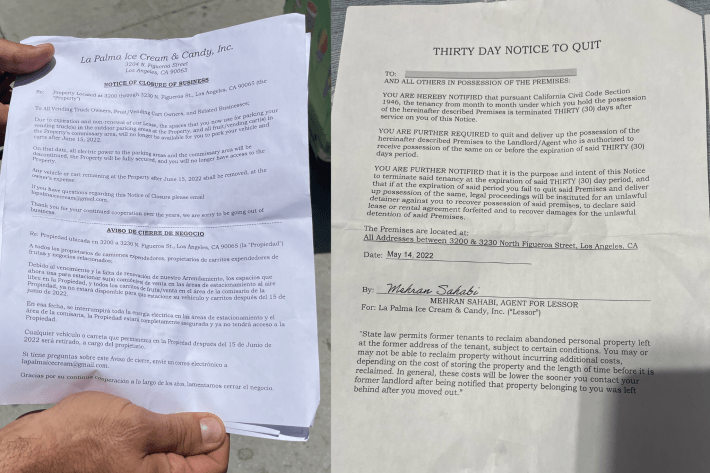
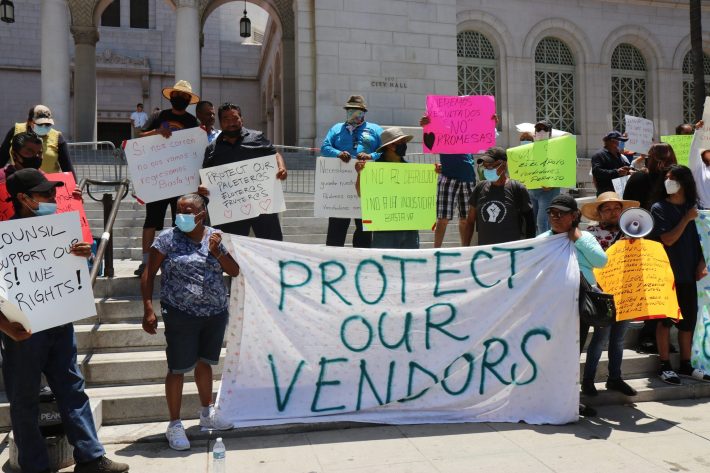
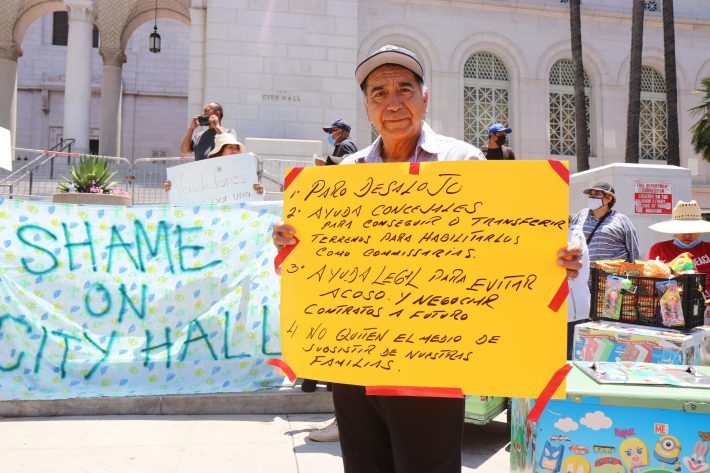
Jose Ayala, an ice cream truck owner stands outside of city hall with a list of demands for the city council and District 1 representatives.
Sixty-year-old Jose Ayala, another ice cream truck owner who sells in Highland Park said finding a new commissary is not easy or cheap. At La Palma, he paid $350 a month to store his truck. After receiving the notice he looked into other commissaries and said the prices were too much.
“It’s absurd that they did this out of nowhere. Gas is expensive and other commissaries are too far for many of us to commute. At a different commissary, I asked how much rent was and they told me $600 or more,” he explained, still in disbelief. “Can you believe that? And there’s still a deposit you need to do that is added onto that.”
Ayala, who paid $32,000 for his food truck through a payment plan says, it is not fair that the health department doesn't want to work with them or provide them with some form of an extension for the abrupt notice. After all, vendors pay close to $1,000 each year for their health permits, depending on the size of their truck or cart, and depending on the items sold.
“I wanted to do things 100% the legal way so I wouldn't run into any problems,” he said. “This truck has everything the health department asks for: the sinks, the refrigerators, so why if we’re doing everything according to the law and we’re paying, why is there no help for us?”
Along with Reyes, he also doesn't understand the lack of communication from the owner, he said most of the vendors at the commissary pay their monthly rent each 6th of the month. Last month, when their payments were due on the 6th, no word was told to them about the closure.
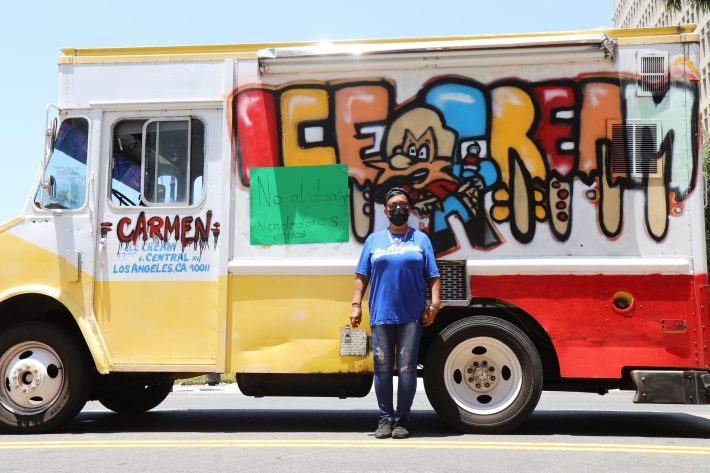
Carmen Reyes stands next to her parked ice cream truck outside of city hall.
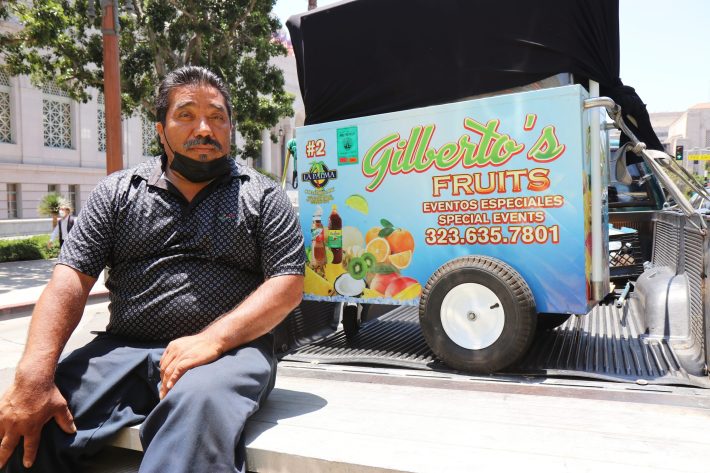
Gilberto Velasquez owner of fruit stand "Gilberto's Fruits" sits in the back of his pickup truck, he brought his fruit cart to protest against the evictions put on vendors by La Palma Commissary.
Vendors and organizers from DefendNela, a group that fights gentrification in Northeast Los Angeles, protested for about two hours outside of city hall.
They chanted “¿Qué quiere la comunidad? What does the community want? Ice cream! as they stood in rows on the steps of city hall. Cars passing by honked in support of the vendors and people passing by were buying paletas from them.
Juan Rodriguez, an organizer with a union for street vendors said vendors did reach out to councilman Gil Cedillo’s office for help. Cedillo did not meet with the vendors but his field deputy, Ricardo Flores did speak with them. According to Rodriguez and DefendNela, all vendors were offered was a set of business workshops to sign up for loans.
“I'm a bit disappointed because Cedillo didn’t meet with us. We understand he is busy but all they offered were business workshops. We don't want that. We need time. We need a space,” said Ayala.
Rodriguez who has been helping vendors organize said they do plan on scheduling another meeting with Cedillo’s office and Supervisor Hilda Solis after elections pass to see if they can help them in any way.
“Lawyers from the National Lawyers Guild are helping us to respond to the notice of eviction, and to respond to the cut of services like electricity at the commissary come June 14,” said Rodriguez.
Fruit vendor Gilberto Velasquez who sells out of a fruit cart said L.A. does not have enough commissaries close enough to all vendors. He said most are 10 or more miles away from their original location and many of them cant afford to drive that far-seeing as money earned isn't always steady. It’s almost going to be a month since they received their notices and Velasquez and other vendors said the owner of La Palma put up a list of four commissaries that vendors can rent from, just last week.
“We have nowhere to go. They gave us options for other commissaries but they are too expensive and too far from the communities where we sell,” Velasquez said as he sat on the bed of his truck. “We don't know who else to ask for help.”
L.A. TACO did reach out to Cedillo’s office, Solis’s office, and the commissary for comment but neither responded to our inquiries.
In the meantime, vendors said they will continue to ask for help as the eviction date arrives and have listed their main demands.
“We do not need a workshop or loans, we know about business we need help relocating and we will continue to ask for help until we receive it,” Reyes said. “We need more time and a place to stay. We do not need to drown ourselves with loans.”







